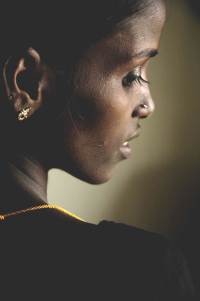Lakshmi was employed as a domestic worker in the home of documentary filmmaker Nishtha Jain in Mumbai, India when she was only 16 years old. But it wasn’t until Lakshmi was 20 that Jain enjoined her young maid to come out from the shadows and step in front of the camera’s lens. Lakshmi readily agreed to the idea. “My life really deserves a film,” she says.Thus begins an on- and off-screen journey for Lakshmi and Jain, which culminates in the revealing documentary LAKSHMI AND ME. The film is an intimate yet critical look at the bond between an employer and domestic worker in modern-day India, where one’s status, relationships and livelihood are often still ordained by the ancient caste system.At the film’s outset, the basic paradox of modern-day Indian culture is exposed. As an emerging international powerhouse, India’s millions of upwardly mobile, professional women are freed from housework and domestic chores. No longer do they have to dust, sweep, do laundry, cook or even walk their children to school. Why? These recent professionals have a bai, or woman to help with some of these chores—a woman who comes from a less privileged class.Like most domestic workers in India, Lakshmi works nonstop—10 hours a day, seven days a week, in six different households. She works without days off, without complaining and without bitterness—all for the paltry monthly pay of 600 rupees or so from each home (the filmmaker confides that is what she herself would pay for a fancy dinner out). “But that’s what everyone pays,” Jain rationalizes at the film’s outset, in a voice-over commentary that follows her personal journey from impartial onlooker to—if not exactly friend—at least a sympathetic advocate.
LAKSHMI AND ME is a story about lines blurring and lives impacting one another, despite the rigidity of archaic traditions meant to keep them apart. The filmmaker enters her subject’s world, only to question the authenticity of her own attitudes; the film’s subject is empowered by the light shone on her in the filmmaking process. At the end of their remarkable year-and-a-half-long journey together, both women are forced to question that which they’ve taken for granted, while acknowledging the symbiotic roles of mistress and maid, subject and filmmaker, speaker and listener.As the film progresses, Lakshmi gains confidence and invites the filmmaker Jain ever deeper into her personal life. The growing intimacy between the two women—one a middle-class professional who enjoys all the modern conveniences, the other an impoverished daughter of a drunk widower with nine children, all of whom must use a community toilet—is a remarkable turn of events in a hierarchical society where class lines build impenetrable walls.
Summary info for schedule – will be hidden on film page

Lakshmi and Me
60-minutes
Screening day / time
Lakshmi and Me
Lakshmi and Me
Filmmaker Notes:
Apart from hoping that we recognize and question our own comfortable acquiescence in society’s widespread, unfair treatment of domestic workers, I hope the film enables all viewers to reflect on the power relationships they themselves may be a part of. And, I hope the film may be used for advocacy and awareness-building by the fledgling unions that are fighting for the rights of domestic workers.Also, I hope that the film doesn’t simply remain a story of Lakshmi and Nishtha, but is able to create larger resonances instead. I hope that the film can make viewers question and examine their own relationships with people working in their homes and vice versa.Currently, the domestic workers in India are organizing themselves and demanding better wages, leave, pension and other benefits. It’s a difficult struggle—especially as they are not even recognized as workers yet being in the unorganized sector—so they need all of our support. I hope the film can contribute to bringing this struggle to the forefront so that more people can join in. I want to distribute the film, possibly in regional language versions, to NGOs and trade unions that are working with domestic workers.There’s widespread resistance to acknowledging that our comfort is based on someone else’s hardship and on the perpetuation of that hardship. But it’s an opportunity for change: at the individual level as well as through legislation for better wages and benefits for domestic workers.I’ve been screening the film at a number of colleges and universities and am hoping for even wider dissemination and discussion.



